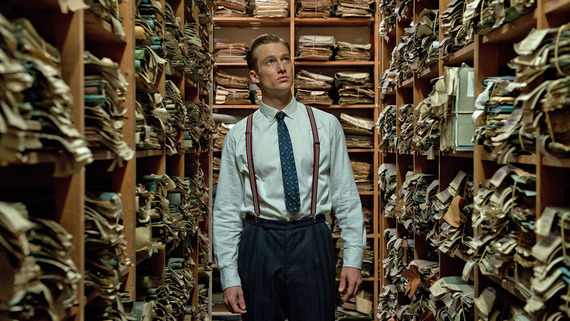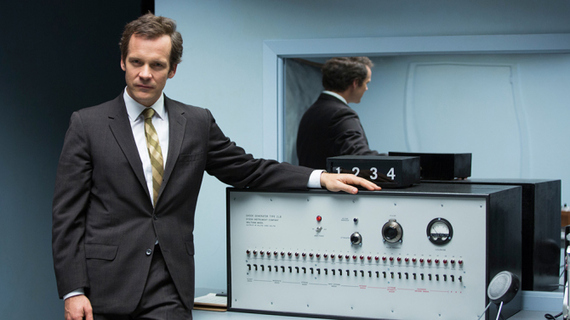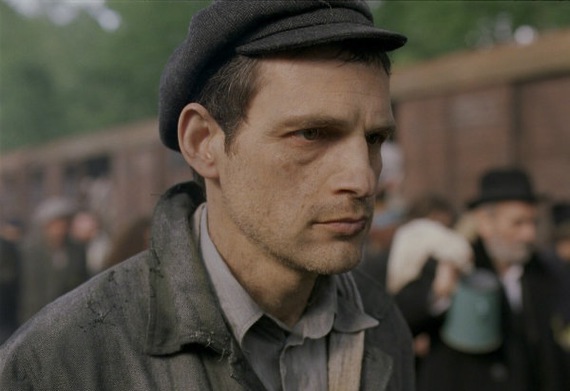Every few years I am inspired to take a look at the changing trends in Holocaust related cinema. This Fall/Winter season brings another excellent crop of fascinating films that bring new perspectives to how the Holocaust is presented in widely-released movies.
For some years now, it has been rare to find a classical telling of the Holocaust on the big screen. New perspectives and humanizing directions have taken the front seat for mainstream releases, replacing the classic black-and-white re-tellings of the Holocaust and keeping its lessons relevant. Films that investigate the German perspective of the Holocaust have become newly popular. The Decent One (by Vanessa Lapa), a groundbreaking film released last year focused on the letters that Heinrich Himmler wrote to his family and beloved. This perspective brings an unprecedented humanity to a man known to be one of the most notorious monsters in history.
This November, we can see Oscilloscope's release What Our Father's Did: A Nazi Legacy, directed by David Evans, about the meeting of two sons of Nazis who carry the sins of their fathers on their shoulders. The guilt and perplexed perspective of the second and third generations is a strong theme in films that attempt to keep the Holocaust relevant.
The ultimate film focusing on the post-war German perspective and guilt is Germany's selection for this year's Oscar race, the upcoming Labyrinth of Lies, directed by Giulio Ricciarelli. The film follows the lead up to the Frankfurt-Auschwitz trials that took place in Germany in the early 1960's. Shadowed by the much better known Nuremberg trials, these trials marked the first time a country tried its own for war crimes. The trials impacted German society, who did not fully acknowledge the horrors of the Holocaust and preferred to keep it silent. The result of this exposure turned Germany into one of the world's leaders in Holocaust education.
Labyrinth takes place in the late 1950's and early 1960's, With Germany in a state of optimism and re-building. We see the joy and colorful activity on the street in every shot. Germans were not looking at the past or dealing with their guilt and shame. It was only after these trials that Germans understood the importance of remembering and owning the past, even at a great cost to themselves.
The film is meticulously told, and uses a classic storytelling structure, making it easily accessible and even entertaining for all. There is a hero's journey showing how one man can make a difference and change himself, as the prosecutor changes from seeing the law as black and white, to understanding the complexities of society. This change in German society, I believe, radiates even today. The film will be released in New York this week by Sony Pictures Classics
Another film relating to the psychological and sociological aftermath of the Holocaust is the upcoming release: Experimenter: The Stanley Milgram Story, by Michael Almereyda, about the much studied sociologist Stanley Milgram and his experiments with obedience and punishment. Ultimately, his experiment exposed our flawed human desire to follow orders. The study conducted in America underlined how following orders to an uncompassionate extreme is not a phenomenon isolated within the Holocaust. Even today, with society's open-mindedness and a heightened awareness of the dangers of blindly following authority, sociological experiments show how peer pressure still impacts people's decision making. ultimately, we are not as independent as we think. Another good example of a modern day look at human nature is in the film (Dis)Honesty - The Truth About Lies by Yael Melamede.
Perhaps the film making the most waves this fall will be the Cannes festival award-winner Son of Saul, by László Nemes (another Sony Pictures Classics release). The film does not take a new twist in humanizing the Holocaust and making it relevant; in fact, it dives straight into the true depths of the absolute horror of the death camps. It reminded me that, as much as modern society might like to intellectualize and remind us that the sun was sometimes shining in Europe in the 1940's, the ultimate actions of the camps were some of the most inhuman atrocities in history.
The film follows Saul, a worker in a death camp, in his blind quest to give a proper burial to one of the gas chamber victims who he thinks might be his son. It depicts an attempted act of humanity in a place where there is none. Nemes takes a unique cinematic approach and shoots the entire film in a soft, dizzying focus, giving a sense of an almost live point of view, while also blurring the background, smartly blinding the audience of some of the horrific imagery. This stylistic choice also captures the state of mind of the inmates living with these horrors. The film opens theatrically in New York in December.
I would be remiss not to mention two films from earlier this year that had great success in the box office and both dealt with the aftermath of the Holocaust: The Weinstein Company's The Woman in Gold and IFC's Phoenix. Both of these films focus on the aftermath and the continued trauma of the Holocaust.
I like to believe that the industry's investment in and praise of Holocaust films is not simply for awards and box office appeal, but for the important moral implications that these films show to our society. At a time when systems are collapsing around the world and countries continue to commit horrific acts, we need to know not to stand silent. I find that our series of social action films at JCC Manhattan (Cinematters) draws a significantly different crowd from our Holocaust-related films. Both audiences should realize that these topics are the same and equally relevant.



